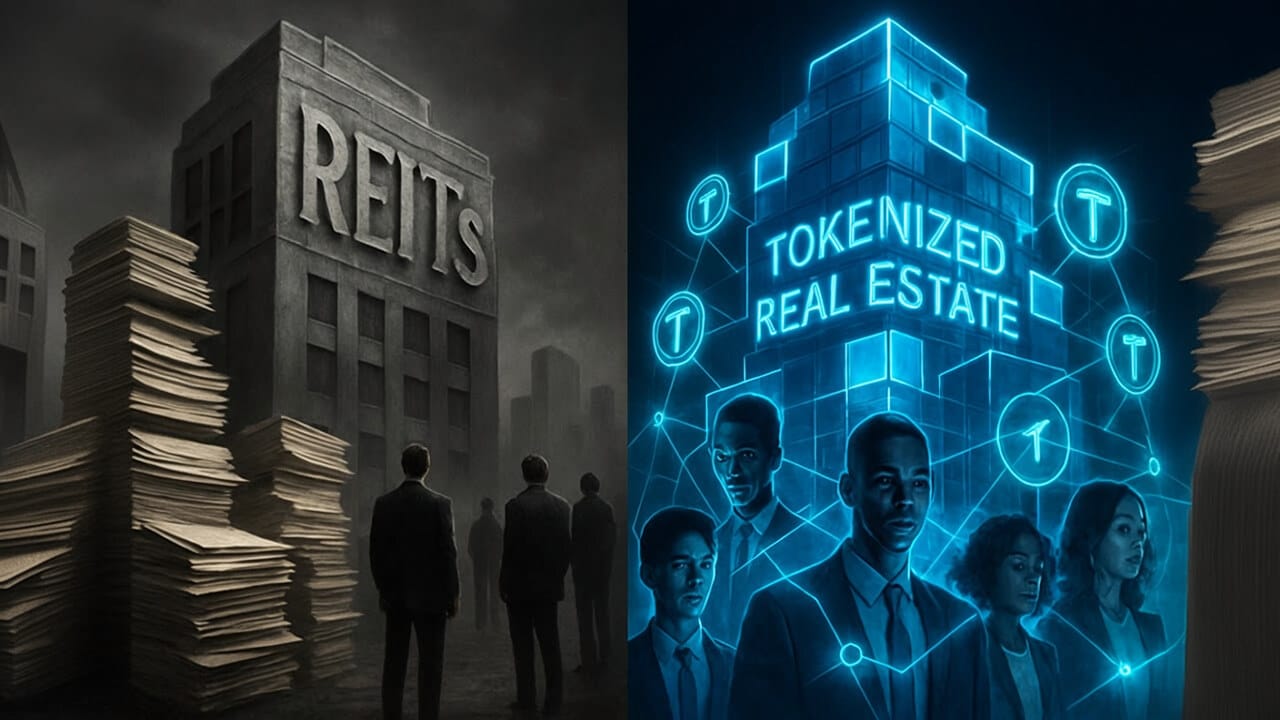REITs are dying.
They were built for a world that no longer exists. A world where geography limited your options, and Wall Street took its cut. Where real estate exposure meant buying into slow, opaque, over-regulated giants. Where your “ownership” was buried in layers of legal wrappers and fees. Where your dividends came late, and your liquidity vanished when you needed it most.
That era is ending.
But before we dive into why that's happening right now, let's first explain the concepts right after our weekly sponsor:
Learn AI in 5 minutes a day
This is the easiest way for a busy person wanting to learn AI in as little time as possible:
Sign up for The Rundown AI newsletter
They send you 5-minute email updates on the latest AI news and how to use it
You learn how to become 2x more productive by leveraging AI
What's a REIT (Real Estate Investment Trust)?
Let’s start by understanding what a REIT actually is
A REIT — or Real Estate Investment Trust — is a company that owns, operates, or finances income-producing real estate.
REITs were created in the U.S. in 1960 to allow everyday investors to gain access to real estate portfolios, the same way they’d invest in stocks. They pool capital from multiple investors to buy and manage commercial or residential property, paying out most of the profits as dividends. REITs are traded on public stock exchanges, which means they offer more liquidity than owning real property directly. Because of their tax structure, they’re required to distribute at least 90% of taxable income to shareholders.
In theory, REITs make real estate investing accessible—but the structure comes with trade-offs.
Investors buy shares in a company, not in the actual properties
Management decisions are made by fund operators—not investors
Property selection, tenant contracts, and leverage are non-transparent
Investors receive indirect income, often with delays and limited visibility
Liquidity is limited to market hours and exchange availability, not true on-demand exits
Sources: Investor.gov; reit.com
“The tokenization of everything is coming. Anything that can be owned can be represented digitally, and that changes everything.”
So Why Are Tokenized Trusts Taking Over?
Now that we’ve broken down what a REIT actually is, the bigger question becomes:
Why is this decades-old structure suddenly under threat?
It’s not just hype. It’s not just crypto. It’s because blockchain technology enables something REITs were never built to do—give regular investors direct access, true control, and instant liquidity.
Here are three core reasons why tokenized real estate is positioned to replace traditional REITs and what that means for anyone still investing the old way.
1) Tokenized Trusts Offer Direct, Transparent Ownership
Unlike REITs, tokenized real estate lets you invest directly in specific properties—not just shares in a fund.
Each token is backed by a real-world asset and recorded immutably on the blockchain. Smart contracts automate rent distribution, legal enforcement, and governance rights. This removes layers of middlemen and makes ownership faster, cheaper, and clearer. You know what you own, where it is, and what income it generates—in real time.
Transparency and control aren’t side benefits; they’re the foundation.
RealT tokens are tied to individual U.S. rental properties, with rent paid daily
Lofty allows investors to vote on key decisions for each property they co-own
Each token links to real property documents via blockchain and smart contract metadata
Ownership is on-chain and auditable, unlike opaque REIT balance sheets
No fund-level abstraction—what you buy is what you own
🏙️ Stay on top of the future of investments
Binaryx Platform Goes Global—Taps into $16 Trillion Tokenization Market
Binaryx, a real estate tokenization startup, announced new expansion after processing US $4.4 million across 25 tokenized properties, enabling investors to receive dividends by the second. Industry projections suggest asset tokenization could unlock a $16 trillion market by 2030, with real estate as a primary driver. (Source)
Blockchain Tokenization Revolutionizes Real Estate Investing
A Coin World report details how blockchain-based tokenization is transforming property investment—dividing high-value assets into digital tokens, automating rent and compliance, and allowing 24/7 global trading. Token holders gain both transparency and efficiency previously unavailable. (Source)
Deloitte, WSJ: CRE Tokenization Could Unlock $4 Trillion by 2035
Deloitte reveals that commercial real estate tokenization may unlock $4 trillion by 2035. The report highlights operational efficiencies, faster settlements, and democratized access as key growth drivers—but notes regulators and custody infrastructure still lag. (Source)
APS Becomes First Institutional Buyer of Tokenized Real Estate
European fund manager APS, overseeing €12 billion in assets, purchased €3.4 million in tokenized residential properties in Italy via MetaWealth—available to retail investors as well. APS’s move reflects a shift toward tokenized real estate being considered a compliant and scalable investment. (Source)
Dubai Land Department’s PRYPCO Mint Sells Out in 118 Seconds
Dubai’s Land Department completed its second tokenized real estate offering on PRYPCO Mint in a record time of 1 minute, 58 seconds. The launch attracted 149 investors from 35 nationalities, with over 10,700 on the waitlist—reinforcing global appetite for digital real estate exposure. (Source)
2) Liquidity Is Built In—Not Bolted On
REITs only feel liquid because they’re listed on exchanges, but their underlying assets are illiquid.
In contrast, tokenized real estate enables peer-to-peer trading 24/7, without waiting for quarterly redemptions. Smart contracts make it possible to list, sell, and settle property tokens on decentralized or regulated marketplaces. This means your exit is no longer tied to fund managers or market hours. It’s real estate with the liquidity of crypto and the stability of hard assets.
This flexibility opens up a level of agility REITs simply can’t offer
Lofty has a built-in secondary marketplace where you can sell tokens after 90 days
INX and Securitize offer compliant trading of security tokens
Token settlement takes minutes—not weeks of legal and escrow paperwork
No need for buyer approval, redemptions, or fund liquidity windows
Tokenized properties can be transferred globally with a wallet and internet connection
📎 Source: Lofty Secondary Market FAQ
3) Tokenization Removes the Middleman and Cuts Fees
REITs carry multiple layers of cost: asset management, legal, administration, and exchange fees.
Tokenized structures eliminate much of this overhead through automation. Smart contracts execute legal functions like rent distribution, voting, and compliance at near-zero marginal cost. There’s no need for fund managers, brokers, or custodians to take their cut. That means more of the rental income or appreciation flows directly to you.
With fewer hands in the pot, your returns stay where they belong—in your wallet
REITs often charge 1–2% annual fees, with hidden operating expenses on top
Tokenized platforms like charge flat, transparent fees, often under 10% of rent
Smart contracts handle distributions and record-keeping automatically
Property management fees are often separated from ownership, giving investors flexibility
Blockchain-based systems don’t require clearinghouses or intermediaries to verify ownership
📎 Source: SEC REIT Fee Structures
That’s a wrap for today
See you next Monday and happy investing!
Do you have Questions About Real Estate Tokenization?
We’re here to help you make informed decisions—not to sell you something you don’t understand.
At Bali Invest, we’ve helped global investors navigate the emerging world of tokenized real estate, with projects like Segara Seaside and Lovina Retreat & Wellness Center leading the way.
1-on-1 Strategy Call with our Team
Let’s map out your investment journey.
We invite you to schedule a complimentary 20-minute call with us.
Evaluate if Bali real estate is right for you
Show you how tokenization lowers your risk
Answer your biggest questions
RESOURCES
Download your free e-book and discover how to invest in Bali real estate like a pro:
Get instant access to our 5-day free educational online course to kickstart your tokenization and real estate investments.
Seeking impartial news? Meet 1440.
Every day, 3.5 million readers turn to 1440 for their factual news. We sift through 100+ sources to bring you a complete summary of politics, global events, business, and culture, all in a brief 5-minute email. Enjoy an impartial news experience.





